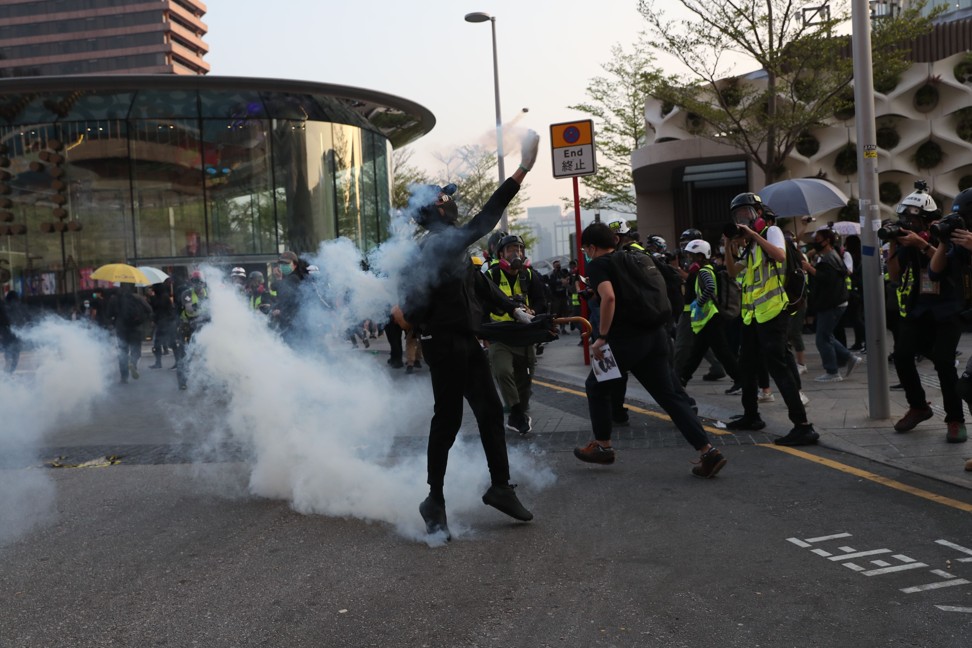
Sa Sa to exit Singapore as Hong Kong protests, dwindling mainland tourists crush retail sales
- Exit from Singapore will allow Hong Kong cosmetics chain to put resources in core markets to help stem six years of losses
- Sa Sa and peers face difficult operating environment as fewer tourists from mainland China deny city’s retailers of crucial ‘lifeblood’
Attempts to boost sales in recent years by restructuring the local management team and enhancing store display and product mix have been “far from satisfactory,” chairman and chief executive Simon Kwok Siu-ming said in a filing to the stock exchange on Monday. The terminated employees will be compensated according to local employment laws, he added.
Sales in Singapore fell 4.6 per cent to HK$99.4 million (US$12.7 million) in the six months to September 30, the company said, representing 2.8 per cent of the group turnover. At the group level, Sa Sa incurred a HK$36.53 million loss in the period.

The 22 stores will be closed as early as possible but the exact timing will depend on negotiations with individual landlords,” he said.
Hong Kong anti-government protests bring biggest retail slump on record
“The double whammy of escalating social unrest across the city and the protracted US-China trade war has resulted in falling retail sales,” said David Ji, head of research and consultancy of Greater China at Knight Frank. “There have been waves of shutdowns and lay-offs at retailers. The situation appears to be as bad as during the Asian financial crisis.”
Sa Sa did not explain how it has been losing money in Singapore. Apart of the need to “stabilise the management team,” the cosmetics chain may have struggled with its focus on neighbourhood malls when shoppers are buying from online stores and retail sales have shrunk every month this year since January.
ong Kong home prices extend rout in October as protests escalated, economy in recession
“Singaporeans, particularly the millennials, like to purchase cosmetic products online from platforms such as Sephora, Lazada, Shopee and evening niche make-up websites,” said Christine Li, head of research for Singapore and Southeast Asia at Cushman& Wakefield. “There are also many competitors in the physical space,” putting bricks and mortar stores like Sa Sa’s under pressure in an economy facing a slowdown, she added.
In its core market in Hong Kong, the operating environment has become extremely difficult due to a drastic decline in mainland tourist arrivals, Kwok said. The primary goal is to focus resources on its core markets and areas with growth potentials to restore profitability, he added.

Best Mart 360 shuns ‘war zone’ Hong Kong in growth plan after stores vandalised
Lin Tsz-fung, chairman and founder of Best Mart 360, wants to reduce his reliance on Hong Kong for growth in favour of opening more stores in mainland China after some three-quarters of its 102 stores in the city were vandalised throughout the social unrest.
Some of the stores have been repeatedly thrashed even after restoration, because of the group’s alleged links to mainland political bodies. Lin has not dared to open a store planned for October, running down the lease at a loss, he said.
Sun Hung Kai pays a record price in Hong Kong’s costliest land tender
Dickson Concepts, which runs the Harvey Nichols department stores, said sales have been affected while margins squeezed by attempts to move on unsold stocks while fixed costs remain elevated. It does not expect a return of Asian and mainland Chinese tourists in the foreseeable future.
“The group is extremely pessimistic about the retail climate in Hong Kong,” founder and group executive chairman Dickson Poon said in a filing to the stock exchange, saying the second fiscal half could be significantly worse. “With Hong Kong in recession, the future looks bleak.”
Falling sales at Chow Tai Fook has also prompted the world’s largest listed jeweller to take some drastic actions. It will close up to 16 outlets in Hong Kong and is seeking 20 to 50 per cent reduction in rents from landlords when renewing leases from October to March next year.
Hong Kong property prices expected to slide further as fears of protests remain
The group reported a 48 per cent plunge in same-store sales in Hong Kong and Macau in the October 1 to November 21 period. Luk Fook, another jeweller, is also planning to close down outlets in areas worst hit by violent protests.
“Retailers and shopping malls in key shopping districts, such as those in Causeway Bay, Tsim Sha Tsui and Mong Kok, have been badly impacted, as the protests centre on these districts,” Knight Frank’s Ji said. “Many of them had to limit their operating hours or even close temporarily. Consumer sentiment will remain weak.”

